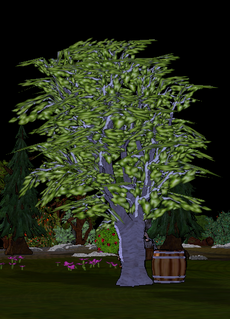Warty Birch Tree
| Warty Birch Tree | |
|---|---|

| |
| Size (obj) Tree & tree-stump footprint in tile units.<br><br><i>Rounded-up from source.<br>Source: 0.708 x 0.708</i><br><br><i>"yobst" is optional. Only needed for non-square trees.</i> | 0.8 x 0.8 |
| Grown From | Warty Birch Catkin |
| Required By | Birch Bark, Warty Birch Catkin |
| Found On | Timber Land, Oak Wilds |
| Bark | 3 |
| Bark Type | Birch Bark |
| Branches | 4 |
| Branch Type | Branch |
| Fruit | Warty Birch Catkin |
| Fruit Qty | 2 |
| Logs | 2 |
| Blocks (Stone) | 50 |
| Blocks (Metal) | 63 |
| Boards (Bone) | 15 |
| Boards (Metal) | 25 |
| Boards (Sawmill) | 32 |
| Go to Trees page. | |
Warty Birch Trees produce Birch Bark instead of regular bark, which is used in several recipes. They can also be tapped using a Sap Tap to acquire Birchsap, which can be used as a sweetener, similarly to Maplesap and Honey.
W16 NOTE: Logs per tree & Blocks/Boards per tree-type-log have become variable (potentially based on some newly added variable tree size property). So these numbers have become general indicators.
The Warty Birch Tree is one of the many Trees found in the Hearthlands. Trees are a plentiful resource and they are vital to every player's success.
Some of the most basic materials a hearthling will require such as Boards, Wood Blocks, Boughs, and Branches are only obtained from Trees.
Every tree has some sort of Seed which the player can use in various recipes, or they can be used to regrow a higher quality tree, producing better materials.
Materials Produced
The Warty Birch Tree produces:
- You may harvest up to 4 Branches before it is depleted.
- You may harvest up to 3 Bark before it is depleted.
- You may harvest up to 2 Warty Birch Catkin before it is depleted.
All Trees will slowly replenish harvested materials, meaning all materials listed above are renewable.
The Warty Birch Tree produces 2 logs when felled. With each log producing:
- Blocks per log:
- Boards per log:
- Note: These numbers only apply for logs from matured trees. Logs from growing trees will give different results.
How to Acquire
Every Tree can be grown from its seed using a Treeplanter's Pot, or by planting the seed directly into the ground.
Using a Treeplanter's Pot: See Treeplanter's Pot for more details
Direct Method: See Shovel for more details
Game Development (empty)
